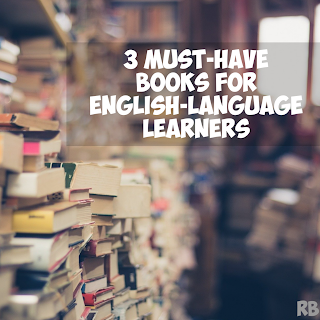3 MUST-HAVE BOOKS FOR ENGLISH-LANGUAGE LEARNERS
I am not going to include fiction in this list. However, if you want to know about the novels every student should read, click here.
3 MUST-HAVE NOVELS
Get the second one (The Shining) if you like ghost stories. Get the third one (Angels and Demons) if you want to enjoy a thrilling adventure. Bram Stoker's classic novel, "Dracula", speaks for itself. You will enjoy reading it. In addition to Dracula, you may also like to read Mary Shelley's "Frankenstein".
Reading will help you improve your vocabulary.
1. LONGMAN IDIOMS DICTIONARY
Cambridge has a box set which is comprised of two books - Cambridge Phrasal Verbs Dictionary + Cambridge Idioms Dictionary.
I have the Longman Idioms Dictionary too. It discusses the use of 6000+ idioms. Unfortunately more often than not it remains out of stock. I have never used the Oxford Dictionary of Idioms, but my colleagues tell me it is really useful.
I often use the Collins Cobuild Dictionary of Phrasal Verbs when I make videos. It is among my most prized possessions.
No. 2 would have been a Phrasal Verbs Dictionary. Since I have already talked about it here, No. 2 would be something else.
2. CAMBRIDGE ENGLISH PRONOUNCING DICTIONARY
My elder brother gifted me the Cambridge English Pronouncing Dictionary when I had chosen Phonetics as an Elective Subject in MA. I had just turned over a couple of pages when I realised I was holding a wealth of knowledge in my hands. And I promise you'll feel the same sensation as I did then. You can learn the pronunciation of each and every English word if you have this book on your table.
It may appear to be a little expensive, but it is worth buying it.
Isn't it strange? I am talking about dictionaries only. In fact, I'll finish this write-up by making you familiar with another (kind of) dictionary. Most learners don't even know that these books exist, but they can learn a lot of new things on their own with the help of these dictionaries. However, I am not going to talk about the regular dictionaries here. You can check them out by clicking on this link.
3. OXFORD COLLOCATIONS DICTIONARY FOR STUDENTS OF ENGLISH
I guess most learners don't know what Collocation is. Let me just explain it briefly.
I always use the Oxford Collocations Dictionary whenever I prepare the Quizzes for the Weekly Vocabulary Test.
What is Collocation?
You shouldn't judge anyone by/on his/her grammar alone.
The purpose of the Vocabulary Tests on this blog is to make the learners realise that grammar is not the only criterion based on which the correctness of language usage is judged. A grammatically correct sentence can be considered incorrect in terms of collocation. The word, "collocation", refers to lexical co-occurrence in a language. Let me give you an example.
A synonym for "strong" is "powerful". However, it does not mean you can replace the adjective, "strong", with its synonym in the following sentence.a. This coffee is too strong for me. b.Some words have natural companion words. In the preceding example, the words, "coffee" and "strong", are companion words. They make a perfect combination. Collocation is the way these combinations ensure that we produce natural speech and writing in a language. Thus, it would assuredly sound odd if one replaces the adjective, "powerful", with its synonym, "strong", in the following sentence.This coffee is too powerful for me.
c. Her speech about cruelty to children was very powerful. d.Her speech about cruelty to children was very strong.
Just have a look at the following examples.
1. It went as planned.
a. It happened went as planned.
b. It occurred went as planned.
c. It took place went as planned.
2. Shopkeepers voiced their outrage at the new schemes.
a. Shopkeepers stated voiced their outrage at the new schemes.
b. Shopkeepers said voiced their outrage at the new schemes.
c. Shopkeepers spoke voiced their outrage at the new schemes.
3. The paragraphs are not in a logical order.
a. The paragraphs are not in a rational logical order.
b. The paragraphs are not in a thoughtful logical order.
4. She read an interesting piece of information in the newspaper.
a. She read an interesting slice piece of information in the newspaper.
b. She read an interesting part piece of information in the newspaper.
5. I could only overhear snatches of their conversation.
a. I could only overhear excerpts snatches of their conversation.
b. I could only overhear snippets snatches of their conversation.
So do you see why it is important to have these dictionaries on your table all the time? Try to get these books as soon as possible.
This website uses Cookies to ensure you have a great experience. Read the Privacy and Cookies Policy.
SUPPORT THIS BLOG BY SHARING THE LINK
WITH YOUR FRIENDS/COLLEAGUES
/STUDENTS.
Subscribe to:
Post Comments (Atom)

No comments:
Post a Comment